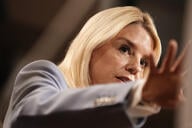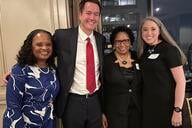You have /5 articles left.
Sign up for a free account or log in.
Before becoming a college president, I held a variety of communications, marketing and enrollment positions at different types of institutions. These roles allowed me to work across the institutions, and because I had to communicate clearly about things I originally knew little about, I was forced to dig into issues and understand them. In many ways I think it was perfect training for what I do as a president. At the same time, I’m surprised now at how the end of the sentence, “If I were president …” has changed for me now that I am the president. While there are many examples, I would boil it down to three main lessons.
The President’s Audience Is Bigger Than I Imagined
When I was a chief communication officer and vice president of enrollment management and marketing, I took pride in thinking I knew who the stakeholders were and using appropriate segmentation strategies. And it would frustrate me when presidents challenged those strategies. What I realize now is that my view was limited by my position. For presidents, there is often a somewhat hidden group of stakeholders, or at least hidden factors influencing decisions of which only the president has knowledge. With the best leaders I worked for, I could engage in conversation, and they would let me know why a particular strategy or message would or would not work.
But even with the most communicative leaders, there were times when they knew and were not able to convey how different stakeholders were going to react and how damaging hitting a wrong note with a particular constituency could be. Sometimes the senior leader did not have the time or energy to explain, and I wish I had realized that when I hoped that they would turn me loose with a “Damn the torpedoes” speech. From my current seat, I can see that is almost never a good idea.
The President Has to Play the Long Game
Particularly when I was working in roles responsible for hitting admission targets, I was hyperfocused on the upcoming class. It built in me an impatience, particularly when I looked at parts of the institution that I did not feel were moving fast enough. Sometimes I thought, “You are the president—can’t you just get that program started or change that process?” The answer is no.
I intellectually understood that a good leader treated every relationship like a long-term relationship, but I didn’t always act like that. A president has to. The president has to know that pushing here or overruling there has long-term consequences that may be five or six years out. The lesson for marketing communication folks is to think on an equally long time frame and, if possible, commit that long time frame to writing in a strategic communication plan.
Patience is indeed a virtue. I am continually amazed by how much of my time and energy as a president goes into planning things that won’t come to fruition for two or three years. And the presidents I admire the most for what they have accomplished are all longtimers who played the long game for the betterment of their institutions.
The President Is Lonely
The president’s role is a lonely one—not only for presidents, but also for their spouses or partners and families. Knowing this now, I wish had made the effort to be a better friend to the leaders I served. I also realize that forming relationships as a leader is complicated—there is some separation that has to occur, and self-protection is a must. What I think I could have provided the leaders I served was an ear to really listen to the overall challenges, not just the ones that were on my agenda. Most good friendships start with listening, and I could have been a better friend if I’d set my agenda aside.
Being a college president is the best job I have ever had (I probably enjoyed my stint as a camp counselor more, but it doesn’t pay the bills) and no one should feel sorry for me, since I’m the one who signed up for this gig. However, the loneliness is somewhat rooted in the need to hold back a little and to be very cautious how and when you communicate. You do truly have to be “always on,” which I didn’t understand until I was “always on.”
One Thing I Was Right About
As a marketing and communication professional, I thought I had one of the most important jobs at the institution because the communication needs were overwhelming. I was right about that, and I don’t think I’ve communicated enough in my role as president, because there are so many priorities. It is good to remind myself of the value of strong communication strategies and make them a primary focus. I was convinced before that our institutions would be better if we continually improved our communication, and I’m more convinced of it today.
Chato Hazelbaker is president of Northland Pioneer College.




